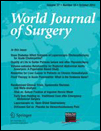Early Oral Feeding Versus Traditional Postoperative Care After Abdominal Emergency Surgery: A Randomized Controlled Trial
Abstract
Background
Early oral feeding (EOF) has been demonstrated to be safe and beneficial after abdominal elective surgery. The aim of this randomized controlled trial is to assess the safety and benefits of EOF compared to traditional postoperative care (TPC) after abdominal emergency surgery.
Methods
Patients assigned to the EOF group commenced a soft diet within 24 h after surgery. In the TPC group, a liquid diet was commenced upon passage of flatus or stool and then advanced to soft food. The primary endpoint was the complication rate. Secondary endpoints were severity of complications, mortality, gastrointestinal leaks, surgical-site infection, reoperation, diet intolerance, time to first flatus and stool, amount of food intake, postoperative discomfort, hospital stay, weight loss at the 15th postoperative day and incisional hernias.
Results
A total of 295 patients assigned to EOF (n = 148) or TPC (n = 147) were analyzed. No significant differences were seen in the complications rates (EOF 45.3 % vs. TPC 37.4 %; p = 0.1). There was a significantly higher rate of vomiting with EOF (EOF 13.5 % vs. TPC 6.1 %; p = 0.03), with no differences in nasogastric tube reinsertion. EOF patients’ food intake was proportionally lower for the first three meals than that of TPC patients (p < 0.01). Postoperative discomfort survey revealed more hunger in the TPC group (p < 0.01). There were no differences in postoperative ileus or length of hospital stay.
Conclusions
EOF was safe after abdominal emergency surgery. EOF was associated with more vomiting (treated easily and without patient discomfort) and less hunger than with TPC. No other EOF-related benefits could be demonstrated during this trial.




